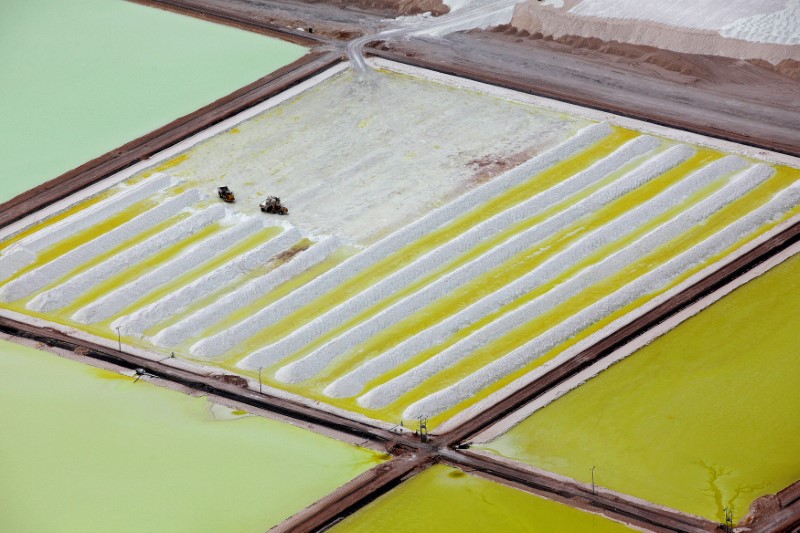By Juliana Castilla
CAUCHARI OLAROZ, Argentina, Nov 13 (Reuters) - The giant pools of turquoise water in the mountainous deserts of northwest Argentina shimmer in the sunlight like oases and for lithium miners like Australia's Orocobre Ltd ORE.AX, that is exactly what they are.
The mid-cap miner is one of several lithium producers stepping up investment in Argentina amid expectations President Mauricio Macri's business-friendly agenda will transform the country into South America's top producer of the mineral, ousting neighbouring Chile in five years' time.
Demand for lithium carbonate, which miners extract from the brine in these pools on the Atacama Plateau, is forecast to boom as production of electric cars rises. Lithium is a key ingredient for the vehicles' rechargable batteries, allowing them to retain energy far longer, and its price has soared more than 30 percent to a record $12,000 a tonne this year.
Since Macri took office in December 2015 and opened the country to foreign capital, Argentina has received more investment than any other country in the 'lithium triangle' - the border region including parts of Chile and Bolivia that contains over half the world's known reserves of so-called "white petroleum."
Orocobre, which produces some 14,500 tonnes of lithium carbonate per year at a mine on the Olaroz salt flat, has announced plans to more than double its total production to 35,000 tonnes by 2019, in conjunction with its partner Toyota Tsusho Corp 8015.T
"There is a real potential that Argentina will leapfrog over Chile in terms of production in five years' time," Richard Seville, chief executive of Brisbane-based Orocobre, said during a visit to the mine. "It is going to be a very important player."
The arid conditions of the lithium triangle high in the Andes, some 4,000 meters (13,123 ft) above sea level, are ideal for evaporating the brine to leave lithium residue.
Argentina holds vast reserves of the white dust but for years, its production trailed its western neighbour as investors remained wary of the successive leftist governments of Nestor Kirchner and his wife Cristina Fernandez from 2003 to 2015.
Argentina is the world's third-largest producer, with some 30,000 tonnes per year, but that is less than half of Chile's annual output of 70,000 tonnes. Australia, the world's largest lithium miner, produces 76,000 tonnes, data from the governments show.
Yet with Macri's two-year-old government making lithium a priority, Orocobre and other miners are bypassing Chile and heading for Argentina.
Executives at Canadian miner Lithium Americas Corp LAC.TO , whose $425 million Cauchari-Olaroz development is close to Orocobre's mine, said Argentina's lithium output could triple in the next five years.
"The shift in mindset around looking at Argentina more favorably has happened very quickly over the last couple of years and obviously that has a lot to do with politics," said Chris Berry, a spokesman for Lithium Americas.
Argentina's energy ministry expects lithium exports to increase to $800 million in the coming years from $191 million in 2016.
'ARGENTINA'S MOMENT'
A clampdown by governments on greenhouse gas emissions that are contributing to climate change is fuelling a boom in the lithium market as car manufacturers start to ramp up electric vehicle production.
Lithium Americas is basing its investments on expectations that global production will triple to 600,000 tonnes by 2025, up from 200,000 tonnes currently.
To attract investment to the sector, Macri's market-friendly government has eliminated an export tax on mineral products and ended a ban on companies sending profits earned in Argentina back to their overseas headquarters.
That has come as a headline-grabbing conflict over royalties in Chile has given investors pause about projects on the other side of the Andes.
State development agency Corfo has claimed Chilean mining company SQM SQMa.SN has not complied with the terms of its concession contract for the Salar de Atacama, a deposit of lithium and other minerals that generates nearly half its revenue.
"This is Argentina's moment. This is the time," Lithium Americas President John Kanellitsas said.
At least five projects aim to add some 45,500 tonnes of production annually by 2019 and possibly more than 200,000 tonnes beyond that. Americas is partnering with SQM to build a plant in Argentina's northwestern Jujuy province to produce some 25,000 tonnes of lithium carbonate, which could eventually be expanded to 50,000 tonnes. Production is expected to begin in 2019.
Other projects underway include Galaxy Resources Ltd 's GXY.AX plans to produce 25,000 tonnes at Sal de Vida.
France's Eramet SA ERMT.PA , meanwhile, plans to produce 20,000 tonnes at the Centenario-Ratones salt flat, while a joint venture between Canada's Enirgi Group Corporation and Australia's Admiralty Resources ADY.AX aims to produce 50,000 tonnes.
U.S. chemical company FMC Corp (NYSE:FMC) FMC.N joined the list last week when it announced plans to invest $300 million to increase its annual lithium carbonate production to 40,000 tonnes at its Hombre Muerto deposit in Catamarca province.
"We expect that with these new projects, and there are more coming, we will be in conditions to offer half of the world's lithium production," Macri told Reuters in New York last week.
<^^^^^^^^^^^^^^^^^^^^^^^^^^^^^^^^^^^^^^^^^^^^^^^^^^^^^^^^^^^ Argentina's lithium mining projects
